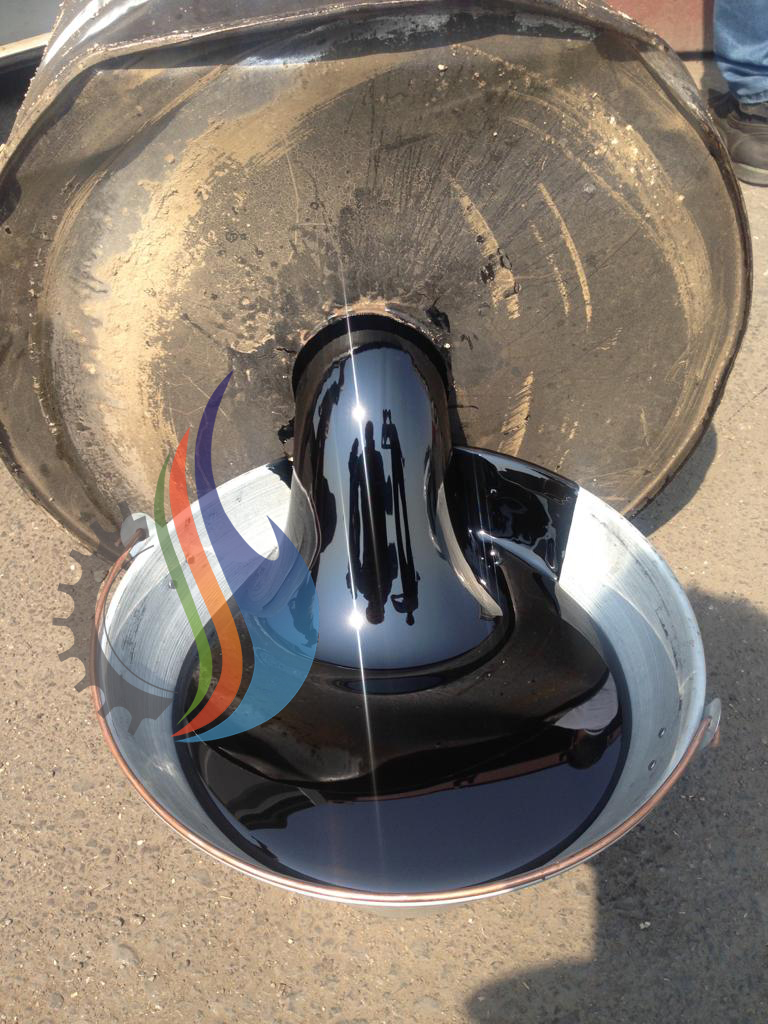
BITUMEN

BITUMEN
All about Bitumen
Bitumen is a low-grade of crude oil which is composed of complex, heavy hydrocarbons. In an oil reservoir, bitumen is a thick, viscous fluid and must be extracted from the ground. Although bitumen is hard to extract from the ground, it can bubble naturally to the surface of the Earth in petroleum seeps. These seeps are places where fossil fuels and petroleum products leak out of the Earth instead of being trapped deep below the ground. In these seeps, bitumen, asphalt, and tar bubble up into pools. Additionally, bitumen is the main fossil fuel component of oil sands. When bitumen combines with asphaltines a solid is formed that is useful for paving roads.
Uses of Bitumen
Most refined bitumen is used in the construction industry. Mainly, it serves its use in paving and roofing applications. 85% of all bitumen is used as a binder in asphalt for roads, runways, parking lots, and foot paths. Gravel and crushed rock are mixed with thick bitumen, holding it together and it is then applied to roadways. 10% of the bitumen used worldwide is used in the roofing industry as its waterproofing qualities help make roofs function well. 5% of bitumen is used for sealing and insulating purposes in various building materials such as carpet tile backing and paint.
In addition to these main uses, bitumen also has many minor uses. Other examples are soundproofing, explosives, mildew protection, a binder in briquettes, a backing to mirrors, shoe soles, fence post coating and soil stabilization.
Bitumen is primarily used for industrial purposes. It can be found in the construction industry where it is used to make roads, which is why it is commonly called asphalt in this application. It also has waterproofing and adhesive properties, which makes it a good product for roofing.
Different Methods for Grading Bitumen
Chewing Test
As its name implies, the Chewing Test required experienced inspectors to chew the bitumen and then either reject or accept it. Because of the tolerances of the human body, the temperatures of the test were much lower than later tests and thus much less accurate.
Penetration Test
The Penetration Test involves inserting a loading needle into a bitumen sample maintained at a steady 25-degree Celsius in a water bath for a period of no longer than 5 seconds. This will produce a penetration angle that is measured as:
1 penetration unit = 0.1 mm.
The higher the penetration value, the softer the bitumen becomes.
Viscosity Testing
The viscosity grading system not only measures penetration as in the penetration system but also measures bitumen binder viscosity at 60 °C (140°F) and 135 °C (275°F) as compared to penetration bitumen grade is tested at 25 °C. Viscosity measurement at two different temperatures indicates its suitability both at low and high temperatures. Viscosity grades are listed in viscosity units poises (cm/g/s–1) or poises divided by 100.
Different viscosity grades of Bitumen that are produced are VG 10, VG 20, VG 30, and VG 40 bitumen. Higher the number, the harder the Bitumen in the viscosity grading system.
VG-10 Bitumen
VG-10 is mostly used in spraying applications such as surface dressing and paving in very cold climates instead of 80/100 penetration bitumen grade. It is also used to produce Bitumen Emulsion and Modified Bitumen products.
VG-20 Bitumen
VG-20 is used for paving in cold climates and high-altitude regions.
VG-30 Bitumen
VG-30 is especially applied to construct extra heavy-duty Bitumen pavements for significant traffic loads. It can be used instead of 60/70 penetration bitumen grade.
VG-40 Bitumen
VG-40 is applied in highly stressed areas such as intersections, near toll booths, and truck parking. Because of higher viscosity, stiffer Bitumen mixes can be produced to alter resistance to road shoving and other problems related to the higher temperature and heavy traffic loads.
Superpave Performance Grade
The newest way to grade the performance of bitumen is by evaluating its performance while in use. Features of the Superpave Performance Grading system include:
1. It includes tests for bitumen binders.
2. The field performance by the engineering principles will influence the physical properties of the bitumen.
3. In order to understand the developing performance of the bitumen, pains are made to replicate its performance for a period of 5 to 10 years.
4. The tests and specification of Superpave system intend to avoid the following three main damages in bitumen:
· Raveling
· Fatigue cracking
· Thermal cracking.
Penetration Grade Bitumen
Penetration grades are one of the most common types of bitumen for road construction. This type of bitumen is known for its durability and resistance to temperature changes; therefore, numerous oil refineries across the world have special plants for producing penetration grades. Penetration grade bitumen is actually a broad category of bitumen that includes more than 5 subgrades, which are bitumen 30/40, 40/50, 50/70, 60/70, 80/100, and 100/120. Among all grades of penetration bitumen, bitumen 60/70 is the most widely used in road construction. Also called the paving grade bitumen, this material works well in a wide range of temperatures (from -22 to +76). But this is not the only reason that bitumen 60/70 is popular in the world.
Bitumen 60/70
Penetration bitumen grade 60/70 is a moderate type of bitumen in terms of hardness, meaning it is not whether too hard nor too soft. Therefore, this grade of penetration bitumen resists temperature changes from -22 to +76. Accordingly, it is a perfect choice for road engineers in various regions, particularly Asia and South-East Africa.
In addition to the quality, bitumen pen grade 60/70 is the most basic form of bitumen, coming out of a vacuum distillation column; therefore, it requires no further processing.
The main advantage of bitumen penetration 60/70 to other grades of bitumen is its reliability. This type of bitumen is capable of extending the performance of the final asphalt by its unique penetration index and softening point. It can also be used in treating the cracks in the time of maintenance.
